| item(s), Total: $0.00 View Cart |
| Shopping cart is empty. |
We're right next to Tass 1 Trees - they're open Thurs/Fri/Sat/Sun - so if you come on these days you can make it a one stop shop! (We're open 7 DAYS - so obviously you're welcome to pop out ANY day...) Bring your keep cups - Jane Brook Fresh (the little fruit & veg shop on the corner) serves delicious coffee & cake (Quondong Jam Tarts, Passionfruit Cheesecake, Bushmint Chocolate Cake etc. etc.) - so what more excuse to you need??? Our new site is a mere 4 minute trip (a couple of kms) by car from our previous site - if you're taking Roe Highway to reach us, take the Toodyay Road exit heading towards the hills and you'll find us. Our new site has a drive thru shed - so if you're just picking up bags, follow the arrows via the far gate and on in and we'll load you. For trailer loading, please park in the yard in front of the bays. For general browsing, there's a large carpark that stretches the whole way in front of the property & Tass 1 Nursery, so please park out front. Bushfire Relief
Like all of Australia - we've been saddened by the bushfires which have ravaged so much of the country and caused such devastation to humans and animals alike. So we've decided that for all retail bags we sell in the months of January & February, we'll donate $1.00 per bag. Bags we wholesale to other retailers we will donate 50¢ per bag. The funds raised will be allocated 70% to the Red Cross Disaster Relief and Recovery Fund, and the remaining 30% to WIRES for wildlife rehabilitation. So wherever you buy our bagged product Jan/Feb you'll be helping make a difference - thank you! So while it's been a challenging start to 2020 - we are aiming for it to be a SUPER year, and we look forward to being of service to each of you in your quest to have a healthy and sustainable garden. We thank you for your continued support. Linda & The team @ The Green Life Soil Co
|
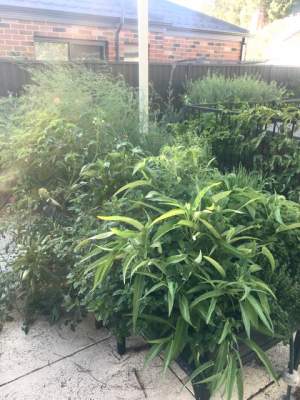 |
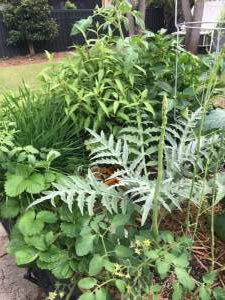 |
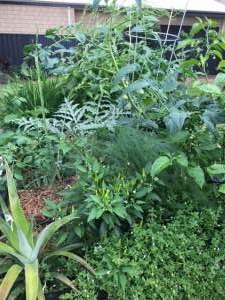 |
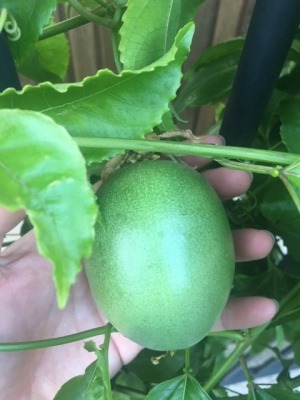 |
Retail Stockists
 Please support the local independent retailers who support us. They've got great local knowledge and are happy to help. (And remember 50¢ from every bag purchased at any of our retailers in January/February goes to support bushfire relief.)
Please support the local independent retailers who support us. They've got great local knowledge and are happy to help. (And remember 50¢ from every bag purchased at any of our retailers in January/February goes to support bushfire relief.)
All stockists carry different items (so give them a call and check!). If there's an item of ours they don't usually carry, in most cases they'd be very happy to add it to their next order for you.
Beaufort Garden World - Inglewood 9271 0585
Garden Elegance - Subiaco 9381 2197
Guildford Town Garden Centre - Guildford 9279 8645
Nibali Stockfeed - Hamilton Hill 9433 2211
Stanbee Stockfeeds - Barragup 9581 2390
Thrive Sustainability - Lower Chittering 0408 157 301
Waldecks Bentley - Bentley 9458 5944
Waldecks Melville - Melville 9330 6970
Waldecks Kingsley - 9309 5088
Waldecks Stirling - 9254 6730
Zanthorrea Nursery - Maida Vale 9454 6260
Australind Landscaping Supplies 9796 1720
Busselton - U scape Garden Centre 9751 3995
Leschenault & Bunbury Markets - Fancy Plants Nursery 0428 844 597
Margaret River - Landmark 9758 7677
THANK YOU for being part of the Green Life family - we hope to see you soon in store (and here next month for the next newsletter!) In the meantime - stay up to date with all the Green Life happenings by following us on Facebook and Instagram.

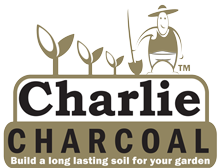

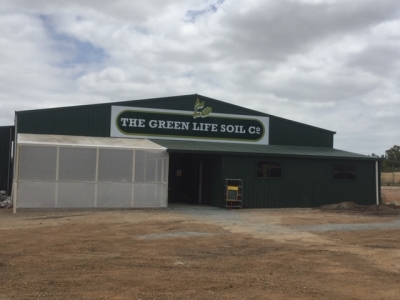 Hello & welcome to 2020! It's been a crazy few weeks around here - our big move happened over the Christmas break. We're now open & operational @ 166 Wilson Road; but still settling in - there'll be many improvements to come over the next year - so keep a look out and we hope to see you soon.
Hello & welcome to 2020! It's been a crazy few weeks around here - our big move happened over the Christmas break. We're now open & operational @ 166 Wilson Road; but still settling in - there'll be many improvements to come over the next year - so keep a look out and we hope to see you soon. 
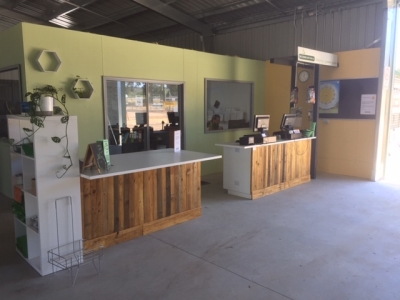 In this newsletter:
In this newsletter: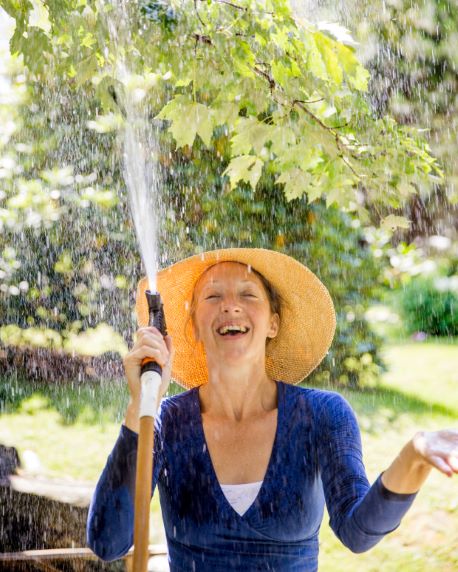 Make sure YOU take care in the heat - slip, slop slap, and work in the cool of the morning or evening to avoid over-doing it in the heat of the day. Stay hydrated and take regular breaks.
Make sure YOU take care in the heat - slip, slop slap, and work in the cool of the morning or evening to avoid over-doing it in the heat of the day. Stay hydrated and take regular breaks.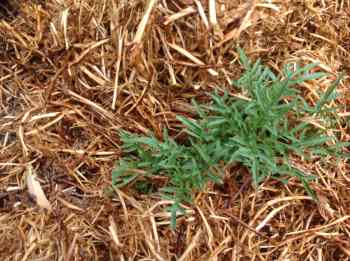
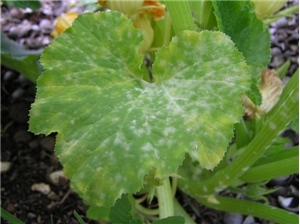 Summer rain and humid conditions can lead to increased fungal problems; watch out for powdery mildew in particular. It can be treated very early on (or even prevented) by a foliar spray of 1 part milk to 10 parts water. Spray all over the leaves (underside too) and repeat maybe twice a week and definitely after rain - and if possible, avoid overhead watering which can exacerbate the problem. You'll need to act early - once the disease has really taken hold it is hard to eradicate.
Summer rain and humid conditions can lead to increased fungal problems; watch out for powdery mildew in particular. It can be treated very early on (or even prevented) by a foliar spray of 1 part milk to 10 parts water. Spray all over the leaves (underside too) and repeat maybe twice a week and definitely after rain - and if possible, avoid overhead watering which can exacerbate the problem. You'll need to act early - once the disease has really taken hold it is hard to eradicate. It's the hottest time of the year in Perth making gardening extra challenging. Remember we've got 50% and 70% white horticultural shadecloth in stock - so get some protection up for your vegie patch and with a daily hand water you'll still be able to have a productive garden. Now's the time of year for some succession planting, time to think about starting winter brassicas from seed (well, almost!), and time to think about your Autumn/Winter garden and what is going to follow on from your summer crops when they run out of steam.
It's the hottest time of the year in Perth making gardening extra challenging. Remember we've got 50% and 70% white horticultural shadecloth in stock - so get some protection up for your vegie patch and with a daily hand water you'll still be able to have a productive garden. Now's the time of year for some succession planting, time to think about starting winter brassicas from seed (well, almost!), and time to think about your Autumn/Winter garden and what is going to follow on from your summer crops when they run out of steam.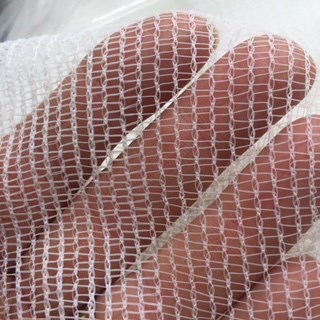 * Disclaimer: Brassica vegetables are best grown as Winter crops here in Perth. While they will grow in Summer, they are more susceptible to pests like Cabbage Moth & Cabbage Butterfly, so it's best to keep them under insect netting (pictured right) at this time of year. Keep up the water as stressed plants will bolt to seed, and ensure seeds & seedlings aren't allowed to dry out.
* Disclaimer: Brassica vegetables are best grown as Winter crops here in Perth. While they will grow in Summer, they are more susceptible to pests like Cabbage Moth & Cabbage Butterfly, so it's best to keep them under insect netting (pictured right) at this time of year. Keep up the water as stressed plants will bolt to seed, and ensure seeds & seedlings aren't allowed to dry out.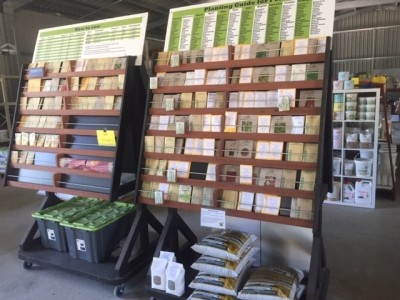 At our new premises we have two lovely seed racks made for us by local hills craftsman - Pete from Hobbit Furniture. The stands mean we have effectively doubled our shelf space for seed display. So there's no doubt - GLSC has the biggest range of non-hybrid/heritage seed available retail in Perth. When planning your autumn garden, come on in and check it out.
At our new premises we have two lovely seed racks made for us by local hills craftsman - Pete from Hobbit Furniture. The stands mean we have effectively doubled our shelf space for seed display. So there's no doubt - GLSC has the biggest range of non-hybrid/heritage seed available retail in Perth. When planning your autumn garden, come on in and check it out.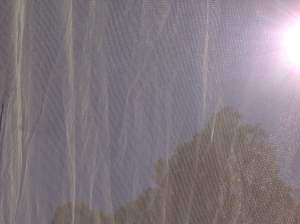 Gardening on the edge of a desert here in Perth is difficult - no more so than in Summer, as temperatures sap the life out of everything but the hardiest natives who have evolved with these conditions. So there's a hint - if you're planning a new garden and want something low maintenance, consider local native plants. There is a wide range available, so visit a good nursery (Zanthorrea in Maida Vale specialise in natives, as does Australian Native Nurseries in Oakford) and get some advice. It is possible to have a colourful and beautiful garden using native plants.
Gardening on the edge of a desert here in Perth is difficult - no more so than in Summer, as temperatures sap the life out of everything but the hardiest natives who have evolved with these conditions. So there's a hint - if you're planning a new garden and want something low maintenance, consider local native plants. There is a wide range available, so visit a good nursery (Zanthorrea in Maida Vale specialise in natives, as does Australian Native Nurseries in Oakford) and get some advice. It is possible to have a colourful and beautiful garden using native plants.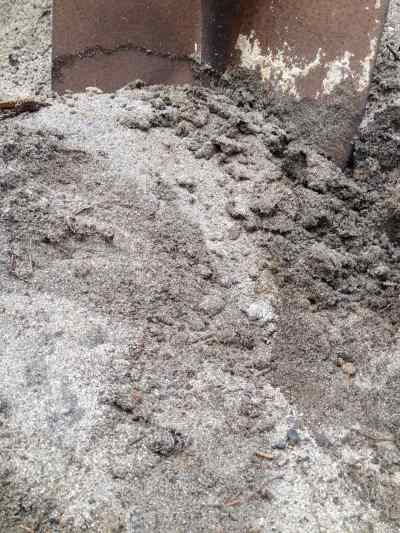 In our sandy soil, the hot weather can dry out the top layers of soil where the microbial life is, and nutrient recycling and water holding just isn't happening. Water will pool on top of the soil, and just runs off if your garden is on a slope.
In our sandy soil, the hot weather can dry out the top layers of soil where the microbial life is, and nutrient recycling and water holding just isn't happening. Water will pool on top of the soil, and just runs off if your garden is on a slope. 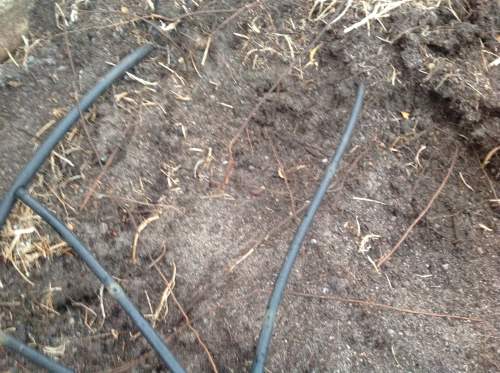 This is a big problem for many gardeners - and because it happens below the surface, it isn't something obvious until you go digging. Your garden beds (especially vegie gardenss) are lavished with love, nutrients and water - and trees, lawns, shrubs etc. from everywhere will sniff that goodness out and send roots in to get their share. Even neighbour's trees can be a problem - they don't respect the boundary fence.
This is a big problem for many gardeners - and because it happens below the surface, it isn't something obvious until you go digging. Your garden beds (especially vegie gardenss) are lavished with love, nutrients and water - and trees, lawns, shrubs etc. from everywhere will sniff that goodness out and send roots in to get their share. Even neighbour's trees can be a problem - they don't respect the boundary fence.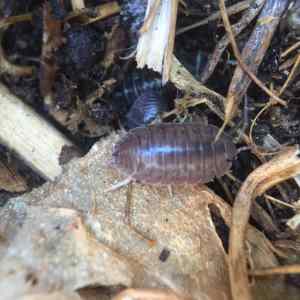 I have mulched most of our vegie garden with pea straw. It does a great job to help protect the soil surface and keep it moist, but it really seems to attract slaters, which have decimated many of my snake beans (grrrrrr). There are a number of traps & tricks you can try if you're wanting to avoid using any pesticides in your garden. Cleaning up areas like piles of wood, prunings and pots will also remove areas where slaters like to populate and hide away. These creatures do have a role to play in gardens. They assist in the breakdown and recycling of organic matter, which in turn makes nutrients available to plants. The problems appear when they breed up to large numbers.
I have mulched most of our vegie garden with pea straw. It does a great job to help protect the soil surface and keep it moist, but it really seems to attract slaters, which have decimated many of my snake beans (grrrrrr). There are a number of traps & tricks you can try if you're wanting to avoid using any pesticides in your garden. Cleaning up areas like piles of wood, prunings and pots will also remove areas where slaters like to populate and hide away. These creatures do have a role to play in gardens. They assist in the breakdown and recycling of organic matter, which in turn makes nutrients available to plants. The problems appear when they breed up to large numbers..JPG) Mealy bug are a type of scale pest - a group of little sap sucking critters that attach themselves to your plants, and can weaken them. Worse, the sticky substance they secrete (honey dew) is sought after by ants as a food source, so ants actively farm them and spread them around your garden. Black sooty mould can grow on the honey dew secretion. This isn't itself such a problem - but it is unsightly.
Mealy bug are a type of scale pest - a group of little sap sucking critters that attach themselves to your plants, and can weaken them. Worse, the sticky substance they secrete (honey dew) is sought after by ants as a food source, so ants actively farm them and spread them around your garden. Black sooty mould can grow on the honey dew secretion. This isn't itself such a problem - but it is unsightly.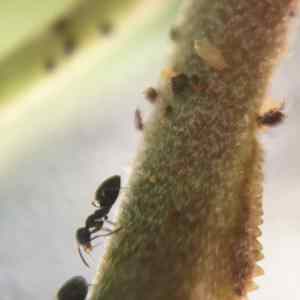 Whether it's spreading scale, or messing up your paving - ants can be a headache. Often they're a symptom of dry conditions - regular watering the garden/s they're in may cause them to move on. Ants in compost or worm farms definitely mean it's too dry. Tipping a kettle of boiling water daily on nests in paving will certainly help. Organic control is limited to a few soft options - you can try our diatomaceous earth, or Eco-ant spray; which is a eucalyptus based formulation.
Whether it's spreading scale, or messing up your paving - ants can be a headache. Often they're a symptom of dry conditions - regular watering the garden/s they're in may cause them to move on. Ants in compost or worm farms definitely mean it's too dry. Tipping a kettle of boiling water daily on nests in paving will certainly help. Organic control is limited to a few soft options - you can try our diatomaceous earth, or Eco-ant spray; which is a eucalyptus based formulation..JPG) Grasshoppers are chewers, ripping holes in plant leaves and spreading disease. They will nibble on tissue of some crops causing it to rot and go brown, and in large numbers they can defoliate plants very quickly. Insect netting will protect vulnerable plants.
Praying mantis are a natural predator; as are many birds - so encourage them in your garden by planting a few shrubs around & supplying a bird bath to provide shelter and habitat. Grasshoppers are sluggish in cooler temperatures early in the morning. If you go out then, you should be able to hand pick quite a few off your plants. You can also use a small hand held vacuum to suck them off sturdy plants. Chickens will devour grasshoppers; and they're edible for humans too - if you're interested!
Grasshoppers are chewers, ripping holes in plant leaves and spreading disease. They will nibble on tissue of some crops causing it to rot and go brown, and in large numbers they can defoliate plants very quickly. Insect netting will protect vulnerable plants.
Praying mantis are a natural predator; as are many birds - so encourage them in your garden by planting a few shrubs around & supplying a bird bath to provide shelter and habitat. Grasshoppers are sluggish in cooler temperatures early in the morning. If you go out then, you should be able to hand pick quite a few off your plants. You can also use a small hand held vacuum to suck them off sturdy plants. Chickens will devour grasshoppers; and they're edible for humans too - if you're interested!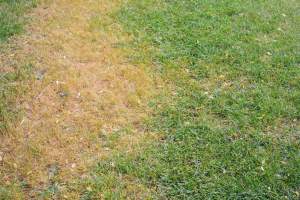 Boy, has this one been a popular topic on social media over recent weeks. Dead patches on your lawn are ultimately a sign of stress - that section of lawn is too hot & too dry to be thriving right now. Often compaction occurs, and there's less opportunity for water to easily work its way into the root zone.
Boy, has this one been a popular topic on social media over recent weeks. Dead patches on your lawn are ultimately a sign of stress - that section of lawn is too hot & too dry to be thriving right now. Often compaction occurs, and there's less opportunity for water to easily work its way into the root zone. 





















